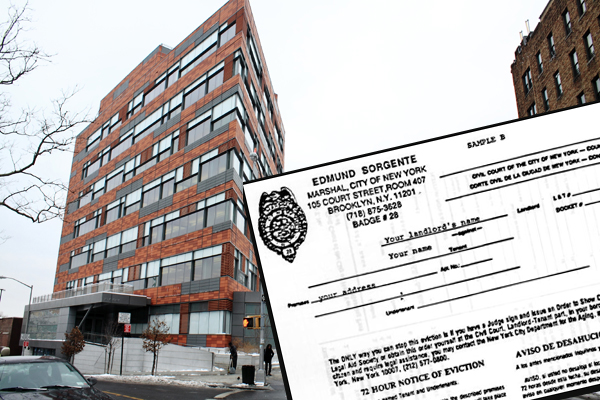The change will suspend a requirement for the Family Homelessness and Eviction Prevention Supplement (FHEPS) where applicants had to show proof that their landlord had filed an eviction against them in housing court for rent payments.

Adi Talwar
New York’s main shelter intake facility in the Bronx.Since 2005, eligible New York tenants who’ve been evicted or are facing the threat of eviction or could receive cash assistance through the Family Homelessness and Eviction Prevention Supplement (FHEPS), the city’s rent supplement program.
Now, after facing a lawsuit last month, the state legislature is waiving the eviction requirement from the program until May 1, when the state’s eviction moratorium — passed earlier this year in an effort to keep tenants struggling because of the pandemic in their homes — ends.
The move is a win for housing advocates who have been calling for such a change to the Family Homelessness and Eviction Prevention Supplement (FHEPS) program, which provides a rent supplement for low-income New York households with children receiving cash assistance who are under the threat of eviction, were recently evicted or who’ve lost housing due a health or safety issue, including domestic violence. Households can receive up to $9,000 in cash assistance for rent under the program, which is administered through the city’s Department of Human Resources (HRA) and funded through the state.
But to qualify, applicants had to show proof that their landlord had filed an eviction against them in housing court for rent payments. This burden of proof became even more difficult to meet during the pandemic, since various government-instituted eviction moratoriums prevented landlords from filing most new nonpayment eviction court proceedings. The current state ban, in place through May 1, halts the eviction of tenants who’ve been impacted by the pandemic and have submitted a hardship declaration form.
In February, the Legal Aid Society and Hughes Hubbard & Reed LLP filed a lawsuit in state Supreme Court on behalf of two New Yorkers who were seeking to apply for cash assistance through FHEPS but were not eligible due to the “lawsuit requirement” in the program. In response, the state amended the legislation to waive that requirement, now allowing HRA to approve applications from tenants who present a rent demand letter from their landlord along with a hardship declaration from stating that they’ve experienced economic difficulties due to the pandemic, such as lost income, increased health or child care expenses, inability to find work or safely move.
“It’s just requiring that written demand letter, which is obviously possible to get even with the eviction moratorium. And then also in most cases, it’s just much easier to get than your landlord having already sued you,” said Lilia Toson, supervising attorney in the Civil Law Reform Unit at The Legal Aid Society.
Advocates have previously called for the city and state to remove the “eviction requirement” from the FHEPS program. Eviction proceedings, they argue, are traumatic for tenants, and the requirement also incentives landlords to file legal proceedings rather than try to resolve nonpayment issues with a tenant outside of court.
Toson says the FHEPS lawsuit requirement is unique to New York City.
“In other parts of the state, outside of New York City, you don’t actually need that. You can just show up with a letter from your landlord, demanding payment on your overdue rent and that will suffice,” she says. “The lawsuit requirement is actually in the city’s FHEPS plan, but it’s not like in any state law, so they can waive it at their discretion as long as the state agency gives them approval.”
The waiver for the “lawsuit requirement” is expected to go into effect immediately and stay in place through May 1, when the state’s current eviction moratorium expires. Those who qualify for FHEPS can receive ongoing help with rent arrears payments of up to $9,000 for up to five years, Toson says.
“One other benefit is that the money’s not recoupable,” she added, pointing to other city emergency cash assistance programs where the funds have to be returned. In the city’s One Shot Deal program, for example, which provides one-time emergency cash assistance for households facing an unexpected event or situation, applicants generally have to pay back the emergency funding they get through a repayment agreement with HRA.
Still, Legal Aid says it is continuing to push Albany to assist with outreach in letting New Yorkers know about the change. Getting the word out about the various tenant relief programs related to the pandemic has been a struggle. The state’s current eviction moratorium, for example, requires households to file a newly-established hardship declaration form to stave off eviction, but few tenants were taking advantage of the protections: just 2,300 households had filed the forms by February, according to Law360. After outreach efforts, the number of hardship declarations filed in court skyrocketed to nearly 24,000 over the last several weeks, the Queens Daily Eagle reported on Tuesday.
Legal Aid is also calling for the state to provide immediate rent relief for families who’ve accumulated more back rent during the pandemic than the FHEPS threshold allows. The program will pay up to $9,000 in rent arrears for those who qualify.
“COVID-19 is still a deadly virus, and Albany and City Hall must do their part to keep families protected in their homes,” Toson said in a statement.










3 thoughts on “State Temporarily Waives ‘Lawsuit Requirement’ for Family Rent Supplement Program”
As a person who works in human services, I receives calls everyday from people requesting assistance with housing and lower income housing options, which are limited, so I would like to express appreciation to the Legal Aid Society and Hughes Hubbard & Reed LLP for filing legal action in the NY Supreme Court , as lifting of these restrictions will make the program more accessible to so many people in the city. I’m sure that you are probably working to get the state to lift the restrictions beyond May 1, but I wanted to take a moment to just acknowledge and appreciate this victory.
Thank you
I have applied for everything as a DV survivor , disabled and NOW a single
Parent with a minor child who has extreme emotional issues due to DV in the home , he was removed we shared expenses he paid the rent and I paid bills as my income was smaller , landlord is non compliant with anything he is asked for refused one shot 3 times due to him not signing a paper , my ex dealt with the landlord as I didn’t . Was in contact with him letting him know I was seeking the help applied for section 8 not chosen, as I was told I would be on top priority due to the situation, already have been served , put in for city fheps and doesn’t seem to be able to reach them , applied for the New program offered for rental help but that could take up to 180 days ! I need surgery my child will start school again and child support I’m sure will NOT be giving as he isn’t working and it comes from unemployment to me from him I am so confused and tend to believe everything is to set up to fail all . Paper looks like I have money coming in but just can’t seem to collect it ex owes close to 6000 in back support and has a history of NOT paying as he had other kids he didn’t pay and she had to apply for PA and he owes the IRS over 120,000 so they take everything. Not enough help out there or quicker turn around times for times in need !
Como puedo en contrar un apartamento de dos cuartos en el bronx con el programa fheps porqe cuesta mucho en contrar apartamento con ese programa